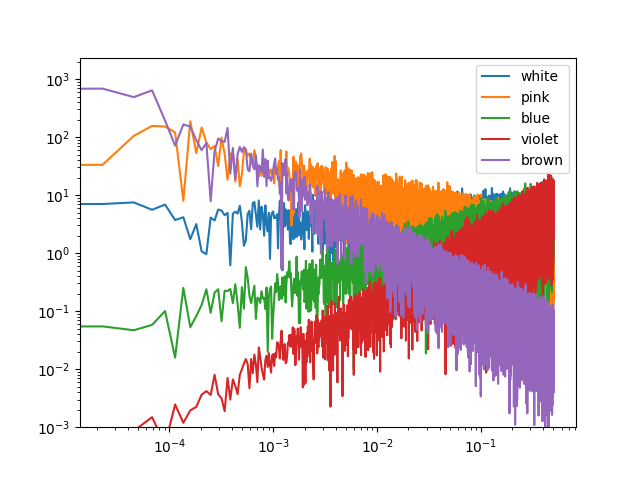Note
Go to the end to download the full example code
Colored noise¶
A noise signal is produced by a stochastic process. The color of noise, also called the noise spectrum, refers to the power spectrum of a noise signal.
The practice of naming kinds of noise after colors started with white noise,
a signal whose spectrum has equal power within any equal interval of
frequencies. That name was given by analogy with white light, which was
(incorrectly) assumed to have such a flat power spectrum over the visible
range. Other color names, such as pink, red, and blue were then
given to noise with other spectral profiles, often (but not always) in
reference to the color of light with similar spectra. Some of those names
have standard definitions in certain disciplines, while others are very
informal and poorly defined.
Source: Wikipedia
import numpy as np
from matplotlib import pyplot as plt
from stimuli.audio import Noise
In this tutorial, we will create and plot the power spectrum of different
noise colors. simple-stimuli implements several noise color in
Noise. Refer to the documentation of the color
argument for available colors.
We can listen to each individual noise by playing each sound with
play().
for sound in sounds.values():
sound.play(blocking=True)
The underlying signal is stored in the signal attribute. The returned
numpy array has 2 dimensions: (n_samples, n_channels). As the volume has
been set identicaly on all audio channels, we can disregard the second
dimension and select only the first channel.
plt.figure()
for color in colors:
signal = sounds[color].signal[:, 0] # retrieve the signal
# compute the one-dimensional discrete fourier transform
frequencies = np.fft.rfftfreq(signal.size)
dft = np.abs(np.fft.rfft(signal))
# plot with log scaling on both X and Y axis
plt.loglog(frequencies, dft)
plt.legend(colors)
plt.ylim([1e-3, None])
plt.show()

Total running time of the script: (0 minutes 15.653 seconds)
Estimated memory usage: 17 MB